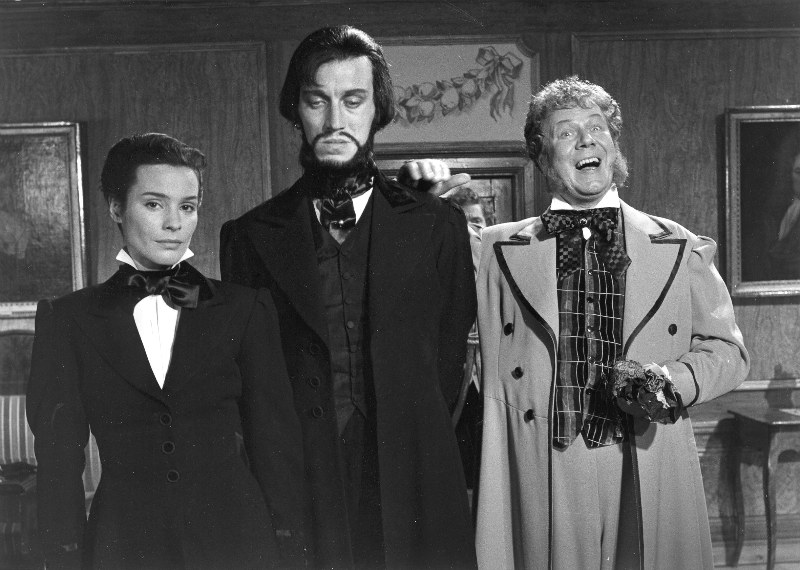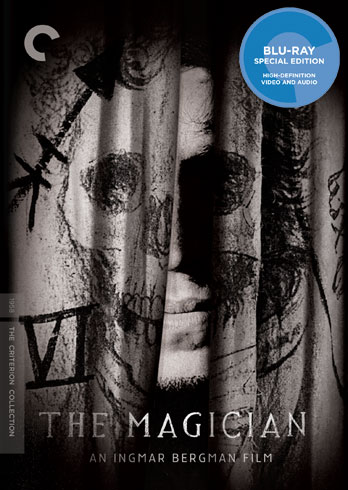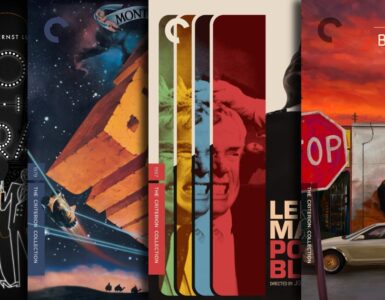I don’t know about the rest of you, but for me the release of a new Ingmar Bergman film is a pretty big deal. By “new” of course I don’t mean that Bergman has come back from the dead to shoot one last masterpiece, or that some previously undiscovered work has been extracted from the vault for all the world to see. But today’s Criterion release of The Magician does represent a resurrection of sorts. Never before issued in this country on DVD, only available on rare subpar VHS transfers until now, The Magician comes from the period when Bergman’s star was first ascending in the popular consciousness of the USA. It was his first thoroughly Bergman-esque production after 1957’s twin pillars of art house cinema, The Seventh Seal and Wild Strawberries, providing a crucial link between those immortal classics and challenging works that followed such as The Virgin Spring, Through a Glass Darkly, Winter Light and The Silence. For anyone interested in delving into the rich body of work that Bergman produced, The Magician’s release is long overdue, but most definitely worth the wait.
Though the Swedish title translates literally as “The Face,” the U.S. re-branding of the film as The Magician makes sense, since the story pivots around a traveling illusionist by the name of Vogler, played by Max von Sydow. Vogler and his entourage drift from town to town across circa 1850’s Sweden, doing their best to stay one step ahead of the law and anyone else who might have reason to believe they’ve been swindled in the aftermath of one of Vogler’s performances. For Vogler, you see, is not merely an entertainer – he claims to have channeled the forces of “animal magnetism,” that give him the ability to induce visions and perform healings for those who submit themselves to his powers. He’s accompanied by a motley company of hucksters – Tubal, his jovial spokesman (since Vogler is mute), his wife Manda who cross-dresses as Vogler’s young male assistant to avoid detection by the police, Simson, feckless driver of their horse-drawn caravan, and Vogler’s grandmother, a withered old crone who keeps the old pagan traditions alive and carries her weight in the company by concocting and selling a variety of potions to the locals. Anyone familiar with Bergman’s films of this era will instantly recognize the faces of many of his stock actors from the other films mentioned above, arousing an instant sense of connection and curiosity to discover new ways that the actors will interact with each other.
Passing through a gloomy forest once crowded, according to the grandmother, with evil spirits, Vogler and company encounter a dying actor, whom they take into the caravan just before he gives up the ghost. As a conjurer and manipulator of spiritual forces who sees through the charlatanism that he himself practices just to make ends meet, Vogler relishes the opportunity to witness an actual moment of death, staring intently into the face of his passenger as the life force drains from his body to see if any clues to the mystery of existence can be discerned by his penetrating gaze. But alas, Vogler simply watches the man die, with no illuminating insight gleaned from the encounter. Can it be that the life of a man simply ends when its energy is exhausted, with no meaning or value beyond that which we the living feebly ascribe to it?
But before Vogler has much time to ponder such weighty matters, mundane realities impose themselves. As they approach the Swedish capital Stockholm, the caravan has been brought into custody by a local magistrate, who has assembled a police chief and the city’s leading medical official to conduct an inquiry. They have obtained copies of Vogler’s publicity materials, both those aimed at respectable citizens like themselves, that emphasize Vogler’s sophisticated background, and those aimed at the common rabble, that promise spooky thrills and marvels just this side of the miraculous. What kind of a racket is Vogler running here, they want to know, and they’re not at all hesitant to use whatever humiliating methods of investigation are at their disposal to figure him out. Also motivating their inquest is a friendly wager between the magistrate, a man who believes that hidden and invisible forces beyond the scope of science do have a bearing on our lives, and the doctor, a materialistic rationalist who scoffs at any attempt to take supernaturalism seriously.
The orders they issue to Vogler are for him and his crew to present a command performance of sorts the following day, for the benefit of the three dignitaries and a few select guests. The session will allow them to determine whether Vogler should be exposed as a fraud or allowed to proceed with his traveling sideshow. This sets up a night of intrigue as the individual characters of Vogler’s company cavort in various ways with members (including servants) of the magistrate’s household. Viewers are treated to scenes of bawdy humor reminiscent of Bergman’s breakthrough sex comedy Smiles of a Summer Night, before matters take a turn to the more serious (and mildly creepy) in The Magician’s final half.
As the disc’s liner notes amply point out, the character of Vogler serves as an autobiographical stand-in for Bergman, racked with his own self-doubts and moral ambivalence about the meaning and value of what he does in his own chosen profession. Simultaneously feeling the admiration and hostility that emanate from different segments of his audience, knowing full well the inherent cheapness and sordidness that lurks behind the illusions he so convincingly puts forth for the entertainment of his viewers, Bergman provides substantial food for thought regarding the fragility of artistic endeavors. Anyone who’s found Bergman the man and philosopher a fascinating object of study should consider The Magician an essential addition to the canon.
And as for the presentation of the film itself, it is absolutely gorgeous in Blu-ray. The hi-def picture brings out incredible depths of monochromatic detail, and the lossless audio, often consisting of little more than the quiet plaintive plucking of a guitar, sets the perfect mood of accumulating tension and dread. It’s worth pointing out that The Magicianwas the last major collaboration between Bergman and cinematographer Gunnar Fischer, who also shot The Seventh Seal and Wild Strawberries. After one more made-for-contract comedy (The Devil’s Eye), the two parted ways as Bergman sought to move away from the dramatic hard-edged contrasts that were Fischer’s specialty. Of course, Sven Nykvist was hardly a step down in managing the camerawork for Bergman’s future films, but Fischer certainly deserves his share of the acclaim for Bergman’s late-50s triumphs.
Rounding out the set is a beautifully designed booklet featuring a short reflection by Olivier Assayas (subject of a just-beginning month long retrospective of film reviews here on CriterionCast.com), an essay on The Magician‘s initial reception and its place in Bergman’s filmography, and a few thoughts on the film from the director himself, all interspersed with the usual high quality movie still reproductions. Special features include a pair of interviews with Bergman, laced with his dry Scandinavian wit, and a visual essay that brings many of The Magician‘s highlights to our attention without forcing us to listen to a full-length commentary track. The gothic-black graphic design makes Criterion’s offering of The Magician an aesthetically pleasing companion piece to The Seventh Seal. I can only hope that Wild Strawberrieswill eventually get its own Blu-ray overhaul to create a second, informal “Bergman Trilogy” within the Criterion Collection.













2 comments